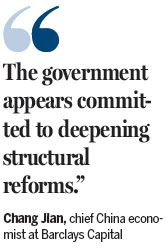Firms' direct financing channels to expand
Updated: 2015-12-24 07:53
By Li Xiang(China Daily)
|
||||||||
The State Council, China's Cabinet, vowed on Wednesday to facilitate greater direct financing for companies from the capital markets and to further improve the efficiency of the financial industry to support the economy.
The measures will include expanding the financing channels for companies, reducing their financing cost and leverage and offering greater financial support to innovative and high-tech startups, the State Council said at an executive meeting presided over by Premier Li Keqiang.
The leadership in Beijing has emphasized the crucial role of the country's stock and bond markets, aiming to develop a multilayered capital market to enrich the direct financing tools for companies.

The pledge came as the country strives to boost the function of the capital markets and seeks to sustain economic growth through supply-side reform. The term often refers to policy measures for improving industrial efficiency and competitiveness while seeking to reduce corporate costs through measures including tax cuts.
The State Council also supported the creation of a strategic emerging industries board on the Shanghai Stock Exchange, to help high-growth and innovative enterprises raise funds through the capital market.
The new Shanghai board is likely to be launched next year. It is expected to initially attract US-listed Chinese technology companies that are seeking to go private and relist in the domestic market. The government also vowed to allow more companies to raise funds on the National Equities Exchange and Quotations, better known as the New Third Board, a share-trading platform for small and innovative companies.
In a separate statement, the State Council said it will cut the price of coal-fueled electricity next year. It aims to reduce corporate costs amid falling coal prices and sluggish production activities.
"The government appears committed to deepening structural reforms, in particular 'supply-side reforms', with five priorities unwinding overcapacity, destocking, deleveraging, lowering operation costs and increasing effective supply," said Chang Jian, chief China economist at Barclays Capital, in a research note.
- More aid from China set for Syria
- Japanese journalist reportedly being held in Syria
- New York City has warmest Christmas Eve on record
- One dead as fight leads to fatal shooting at North Carolina mall
- Trump's lead bodes well for Hillary Clinton's presidential bid
- Spanish Socialist leader insists no support for Rajoy

 China's top scientific achievements in 2015
China's top scientific achievements in 2015
 Yearend 2015: A picture and its story
Yearend 2015: A picture and its story
 Christmas celebrated across the world
Christmas celebrated across the world
 HK car show kicks off during Christmas season
HK car show kicks off during Christmas season
 10 major economic policies that will make a difference on lives
10 major economic policies that will make a difference on lives
 Santa Claus is busy in China
Santa Claus is busy in China
 Yearend 2015: Heartstopping images captured by daredevils
Yearend 2015: Heartstopping images captured by daredevils
 Girl becomes youngest Master of Memory
Girl becomes youngest Master of Memory
Most Viewed
Editor's Picks

|

|

|

|

|

|
Today's Top News
Shooting rampage at US social services agency leaves 14 dead
Chinese bargain hunters are changing the retail game
Chinese president arrives in Turkey for G20 summit
Islamic State claims responsibility for Paris attacks
Obama, Netanyahu at White House seek to mend US-Israel ties
China, not Canada, is top US trade partner
Tu first Chinese to win Nobel Prize in Medicine
Huntsman says Sino-US relationship needs common goals
US Weekly

|

|








